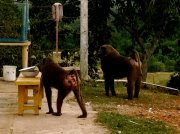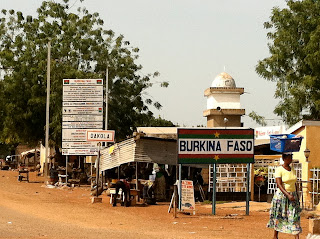This past weekend, we visited Mole National Park, a two hour drive outside Tamale on some of the worst roads we’ve seen. At one point during the drive, the road narrowed to a three foot wide isthmus and our cab was forced to back up and choose the shoulder of the road instead. At another point, I was rudely awoken from my nap (we left at 6 am, I deserved the nap) when the cab nearly stalled out in a sand pit that, for some reason, took up most of the road. At any rate, we arrived in Mole miraculously intact and thoroughly in need of some time at the pool. The pool overlooked a jungle transitioning to savanna, with two large watering holes. Watering holes frequented by ELEPHANTS. We watched them all afternoon doing elephant things, like ambling around and taking showers using their trunks. Several hours into our elephant reverie, however, a band of baboons came tearing through the pool area, swiping Lyubov’s apple from our table and freaking out pretty much everyone. Baboons, and warthogs we later discovered, pretty much roam free around the hotel site. Accordingly, we chose to eat dinner inside.
The next morning, we joined a 7 am walking safari into the park. Led by an guide armed with a rifle, it was actually a pretty intense hike, at times requiring us to walk across logs to cross a stream or scamper up a hill because a charging elephant is right behind you. Seriously, but we’ll come to that later. Having already seen the baboons and warthogs more up close than we ever intended to, the real point of the safari was to find an elephant. We/the guide tracked down a group of three hidden in the trees, and encouraged us to go as close as we wanted. They shied off when a large group of Ghanaian school children came rustling through the trees, and our guide explained that they’re actually quite shy. They would much rather flight than fight, and there’s never been an attack at the park. The only time they do attack, he went on, is when they’re injured or when a baby is involved. Even then, the warning signs are clear: ear flapping and trumpeting. Good thing he told us, too, because not ten minutes later we were creeping close to another elephant we’d come across, all down on one knee for the best possible angle. And then we saw the ear flapping. And then the guard had his rifle up, and there was yelling, and we were running up an embankment, and then an elephant came charging out of the underbrush. There were some tense words exchanged with our guide, who brushed the whole thing off with a very casual “Oh, that one is injured.” BUT WE’RE FINE, MOM. We’re great. And it’s a fabulous story.
 |
| WAYYYYYY TOO CLOSE |
Monday was my 22nd birthday, which makes me feel old just to type. With our research falling apart around us, most of the day was spent fighting back tears and reading emails aloud with emphatic outrage. In the midst of this though, Mary, Ceci, and Lyubov really did throw me a nice birthday. I had a crown and a lovely pizza dinner in Bolga, and the night really took everyone’s minds off of how badly our projects are going. We spent a long time singing along to Mary’s 4th of July playlist, and especially with Thanksgiving coming up, I think we really all just want to go home.










